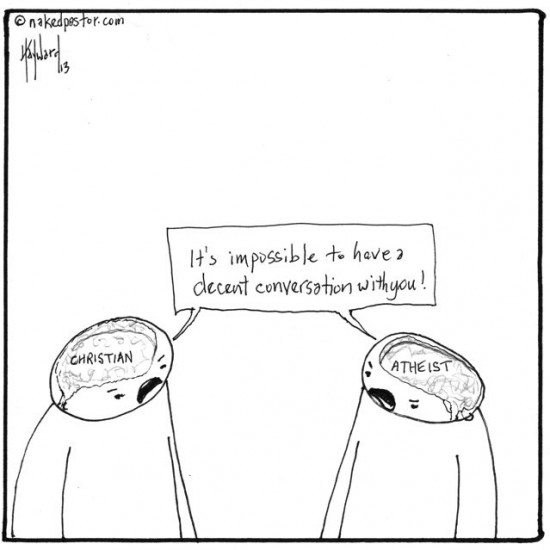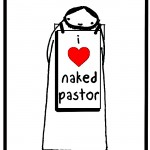
I like the writing of Steven Olsen. For example, his recent post, “Gorilla’s, Starship Commanders and Your Brain” is a good read. Interesting and informative. And I like his sense of humor. Olsen writes for the atheist channel at Patheos. I read atheist writers and blogs for many reasons. One of the most important reasons is that I believe many atheists help to keep me honest. I have an inner atheist and so I think it wise to take care of that part of me. They can also teach me how to communicate what I mean more clearly.
He wrote an article a while back, “About That Personal Experience of Yours”. I was smiling as I read it because I felt like I was back in Personal Evangelism class in Central Bible College in Springfield, Missouri… which is where Olsen lives actually. He gives instructions on how to communicate with a believer; how to “debate with a theist”; how to “guide someone out of a belief”; how to “reach” believers effectively. So it’s about evangelism.
Olsen describes for atheists how Christians believe:
- Religion doesn’t have evidence so it relies on experience for validation.
- These experiences, though meaningful to believers, aren’t testable.
- Since they are not testable, they are “indistinguishable from a fabrication”.
- So the believer must demonstrate why God should be more real than Bigfoot.
- Specifically, Christianity’s god is cruel for creating Hell for unbelievers as well as immoral since he hides from them.
- Worse, since Christians believe in the Devil, how do they know their spiritual experience isn’t just a deception?
- No matter how convincing your logic is, they may return to superstition because of the meaningfulness of their experiences.
I’ve never understood how some atheists leap from God to Bigfoot. Some ideas or theories are valid to consider and others are not. I think the possible existence of God, or the idea of God, or the theory of God, is more valid to explore than the possible existence of Bigfoot, or the idea of Bigfoot, or the theory of Bigfoot. Some ideas, some possibilities, have better legs than others. I agree that experiences do not prove the existence of God, but I am not willing to entirely dismiss them as irrelevant to the case, along with all the theories about the idea of God or those that thought or think them.
I also find it curious how quickly and easily some atheists solve the age old problem of evil. The ancient Greek philosopher Epicurus stated the argument this way:
- If an all-powerful and perfectly good god exists, then evil does not.
- There is evil in the world.
- Therefore, an all-powerful and perfectly good god does not exist.
But that isn’t the end of the argument. Epicurus’ is not the only solution on the table. There are all kinds of others theories out there. His argument might appear logical, but many thinkers down through the ages have challenged the first part of the equation and wrestled with the problem of evil along with the possibility of the existence of God. It continues today. If the first part is faulty then the rest of the logic fails. This whole area of thought is called theodicy and has been going on for centuries. We are allowed to ignore all other arguments but Epicurus’, but I think we would be placing unreasonable restrictions on our minds.
G. K. Chesterton had something to say about this:
“Spiritual doctrines do not actually limit the mind as do materialistic denials. Even if I believe in immortality I need not think about it. But if I disbelieve immortality I must not think about it. In the first case the road is open and I can go as far as I like; in the second the road is shut.”
Chesterton’s concern is with free will and freedom of thought. He believed spiritual doctrines opened the mind to a limitless freedom of possibilities, whereas the other is “the worst chain that ever fettered a human being” because without free thought you don’t have free will.
One experiences the Divine one day and experiences evil another. Which is more or less real than the other? How is this testable or measurable? How are these confirmed? Many say there is no Divine. Many say there is no evil. Who judges who is right or wrong? And how?
Anyway, I enjoyed reading the article because, like I said, it was interesting to see how an atheist would try to convert a believer. It reminded me that, in many ways, atheists and believers are the same. Everyone believes their religion, belief or philosophy is the right one or they wouldn’t embrace it, and, therefore, everyone believes that everyone else should subscribe to it or they wouldn’t themselves. But, even though Olsen is obviously trying to be gracious, there is a slight tone of condescension in the article that smells like the condescension some believers have towards atheists. Like some believers talk about atheists, Olsen talks about believers like they have a mental illness and need to be treated with pity. He closes:
“Every single believer is different and you won’t reach them unless you tailor your argument to who they are, and acknowledge that while you have good reasons not to believe, that doesn’t diminish the effect the event had on them. Your logic will have better mileage when you mix it with empathy.”















